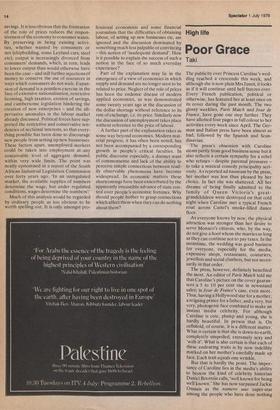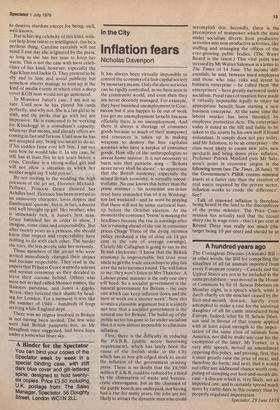High life
Poor Grace
Taki The publicity over Princess Caroline's wedding reached a crescendo this week, and although she is now plain Mrs Junot, it looks as if it will continue until hell freezes over. Every French publication, political or otherwise, has featured her at least once on its cover during the past month. The two glossy weeklies, Paris Match and Jour de France, have gone one step further. They
have allotted four pages in full colour to her activities every week since April. The German and Italian press have been almost as bad, followed by the Spanish and Scandinavian.
The press's obsession with Caroline stems partly from good business sense but it also reflects a certain sympathy for a rebel who refuses — despite parental pressures — to take a musical comedy principality seriously. As reported ad nauseam by the press, her mother was less than pleased by her choice. In fact she was shattered. All her dreams of being finally admitted to the family of Queen Victoria's greatgrandchildren were destroyed on that cold night when Caroline met a typical French roué across Castel's smoke-filled dance floor.
As everyone knows by now, the physical attraction was stronger than her desire to serve Monaco's citizens, who, by the way, do not give a hoot whom she marries so long as they can continue not to pay taxes. In the meantime, the wedding was good business for everyone, especially for the media, expensive shops, restaurants, couturiers, jewellers and social climbers, but not necessarily in that order.
The press, however, definitely benefited the most. An editor of Paris Match told me that Caroline's picture on the cover guarantees a 5 to 10 per cent rise in newsstand sales; in Jour de France's case, even more. Thus, having a Hollywood star for a mother, a reigning prince for a father, and a very, but very, photogenic face combined to make an instant media celebrity. For although Caroline is cute, plump and young, she is hardly beautiful. In person that is. On celluloid, of course, it is a different matter. What is certain is that she is down-to-earth,
completely unspoiled, extremely sexy and 'with it'. What is also certain is that each of these endearing traits is by now indelibly marked on her mother's carefully made up face. Each trait equals one wrinkle.
But that is hardly the point. The importance of Caroline lies in the media's ability
to bestow the kind of celebrity historian
Daniel Boorstin calls, 'well known for being well known.' She has now surpassed Jackie
Onassis as the numero uno super-star among the people who have done nothing
to deserve stardom except for being, well, well-known.
But achieving celebrity of this kind, without help from talent or intelligence, can be a perilous thing. Caroline certainly will not mind if one day she is ignored by the press, so long as she has her man to keep her warm. This is not the case with most celeb
rities of her kind, however, especially the Aga Khan and Jackie 0. They pretend to be
shy and to hate and avoid publicity but somehow always manage to turn up at the kind of media events at which even a deep cover KGB man would not go unnoticed.
In Monsieur Junot's case, I am not so sure. Until now he has played his cards perfectly, and why not. She is a fun girl to be with, and the perks that go with her are impressive. He is rumoured to be working for Khashoggi in a consultant's capacity, whatever that means, and already offers are coming in fast and furious. Until now he has not accepted any, being too smart to do so.
If his sudden fame ever left him, I am not sure how he would take it. In any case, he still has at least five to ten years before a crisis. Caroline is a strong-willed girl and will not allow a situation in which her mother might say 'I told you so'.
By not inviting to the wedding the high priestess of the jet set, Florence Michard Pellisier, Princess Grace showed her Achilles heel. Florence has been married to an unsavoury character, loves dopers and flamboyant 'queens', but is, in fact, a decent and well brought up girl. Her brother, who is immensely rich, is Junot's best man. Grace banished her in order to show, I imagine, some class and respectability. But after twenty years as a princess, she should know that respect and respectability have nothing to do with each other. The harder she tries, the less people take her seriously.
Those members of the jet-set who were invited immediately changed their stripes and became respectable. They read in the
papers that Princess Grace wanted a solemn and serious ceremony so they decided to leave their cocaine behind. Others who were not invited called Monaco names, the Rainiers parvenus, and Junot a gigolo. Worse, they covered their shame by heading for London. For a moment it was like the summer of 1940 — hundreds of frogs arriving while England slept.
There was no stigma involved in Britain in not having been invited. The few who were had British passports but, as Mr Maugham once suggested, had been born under a somewhat bluer sky.







































 Previous page
Previous page